You Should Be More Worried About Trump's Planned Military Purge
Trump wants officers loyal to him, not the constitution
The failed effort by the President of Korea to impose martial law can be viewed as a victory for democracy. The opposition immediately pushed back, and he faces investigations and possible imprisonment.
But it could easily have gone the other way.
Military leaders were not briefed on the plan, and delays in moving troops to the parliament gave vital time for legislators, their staffers, and crowds to organize and create barricades. The commanding officer on the site said that he did not authorize the arrest of members of parliament, the use of live rounds, and urged no violence against civilians. What if he had?
At the end of the day, democracy often depends upon whether the military will open fire on their own people. Will they blindly follow orders by an authoritarian, or will they respect democratic norms?
Which brings us back to the United States. Trump has proposed an unprecedented purge of senior military officers: “I would fire them. You can’t have woke military.” His nominee for Secretary of Defense, Pete Hegseth, and groups on the right like Heritage Foundation and the Claremont Institute, have called for the President to “clean house in the Pentagon.”
Before we go any further, you might be asking yourself, can Trump do this?
The short answer is yes. As Commander-in-Chief, Presidents have considerable discretion in how they can shape military personnel. The fact that they have not used it in the past is a testament to the bipartisan respect that the military holds. Previous presidents did not see any need or advantage to politicize its ranks, and would have been pilloried for doing so. But Trump, in this way as in so many others, is different.
Who might be targeted? An organization funded by the Heritage Foundation, the American Accountability Foundation (AAF), released a list of names of senior officers to be removed, using the criteria that Trump and his DOD nominee Pete Hesgesth offered. In a public letter to Hegseth, they said:
Purging the woke from the military is imperative, but just revering [sic, I think they mean reversing] woke policies would not be enough to bring our military to peak preparedness. Those who were responsible for these policies being instituted in the first place must be dismissed. As you, sir, eloquently put it, “Any… General, Admiral, whatever that was involved in any of the DEI woke sh*t has got to go." We applaud your mission to root out woke military leaders and write to you today to share the names of some woke individuals that you can show the door on day 1.
Propaganda for Purges
AAF has already created enemies lists of civilian employees, relying on the type of opposition research normally reserved for politicians. They do this because there is an audience for it not just in the Trump administration, but in Trump-aligned media. Reporters get a press release from AAF, and then repost the accusations with zero effort to assess the credibility of the claims, or the broader consequences. Fox News and the New York Post also posted the pictures of those accused of wrongdoing.
As a result, the accusation that military officers are “woke ideologues” is uncritically treated as national news. Without living through it, I don’t think we can fully assess what these sorts of accusations are like for the individuals involved at personal or professional level. Even if they are not fired, their reputation and prospects for rising in the military are now under a cloud.
What Do the Charges Actually Involve?
People love to talk about how dangerous wokeness is, so what are we talking about here? Given the desire to purge officers, and headlines about “woke ideologues”, their actions must have been pretty radical, right? Well, lets look at the details about what these officers actually did. Here are a list of some of the things that the American Accountability Foundation identified as a justification to end a military career.
Promoting a DOD-organized DEI summit on their social media.
Noting positive changes in DEI in the military
Sharing peer-reviewed research about race in organizations
Member of a working group to identity barriers to inclusion for Pacific Islanders and Asian American
Visited HBCUs to expand recruitment of Black students into military intelligence
Accepted the Government Agency of the Year Award an award on behalf of the Navy from the Society of Hispanic Professional Engineers
Served on a panelist on a discussion of DEI, or participated in an event hosted by a DEI group
Retweeted a positive message about a Ruth Bader Ginsburg stamp!
Liked a LinkedIn post celebrating International Women’s Day
Hosted a Memorial Day event honoring veterans in coordination with a DEI team
“Shares divisive content on social media promoting DoD LGBTQ agenda.” This is the divisive content:
Here are statements made by the accused officers that AAF picked out to justify firing them:
“We’re trying to eliminate the barriers, open the doors and make sure that we can have the best most capable force that our nation can provide.”
“Our diversity is our strength.”
Posting “We are a team. We must treat each member of our team with dignity and respect” during Pride month.
"We're gonna work hard and we're gonna continue to strive to make sure that we're the most diverse force in the Army, and that will allow us to dominate and win on future battlefields.”
“Retaining the very best people that we have and promoting them, that I think is an individual inside-the-lifeline task that each captain has to take on.”
"Everyone on our team is coming from a different place, coming with a different perspective, and some people are coming with a bias whether it's a conscious bias or not.”
“We must work to end bias and prejudice in all its forms, and ensure equal opportunity, dignity, and respect for all.”
“You know, I think the interesting thing as captain, we talked earlier about the different perspectives that are brought to an organization by those with a diverse background. It could be race, religion, what part of the country you grew up in, you know, there’s sooo many ways you can slice into the diversity concept….It really makes us all better and stronger as an organization.”
There is more, of course, but these are the things that a group of professional opposition researchers dug up after months of research to cement the case for runaway wokeness in the military. Now, if you are all in on this narrative, nothing I can say will change your mind. On the other hand, you have to hold fairly radical beliefs if you find these actions and statements to be damning.
Simply participating in discussions that suggest that diversity is a good thing, or that we should want women or persons of color to succeed in the military is now enough to end your career? Really? In some cases, what AAF defines as divisive concepts is simply an acknowledgment that LGBTQ+, women or persons of color exist in the military, or should exist in the military. If Pete Hegseth makes it to a Senate hearing, a useful thing a Senator could do is repeat the statements above and asks him if he will fire officials for saying things like “our diversity is our strength.”
Purged for Doing Their Job
There is no accusation that the military officers violated any rules. The DOD limits political expression, but does allow officials to express opinions on political issues as long as they are not clearly partisan. So it is very difficult to assume that some non-partisan expression of support for diversity violates any rules.
In fact, it is closer to the truth to suggest that these officials are being attacked for following organizational policies. The US military committed to, and struggled with, issues related to inclusion since the integration of the armed forces after World War II. This is not a new challenge for them, even if the terminology has changed. The DOD, as an organization, has an office and budget that supports DEI. It is clearly an approved organizational strategy for strengthening the military. Many of the comments cited above tie diversity to effectiveness, because a more diverse workforce includes more talent. This claim is supported by research.
And so, even if you disagree with the statements above, you might still find it deeply unfair to purge officials who simply embraced organizational practice. In many cases, these officials were acting in their capacity as public officials. They were invited to talk as a representative of the DOD about DEI issues, or asked to serve on a DOD official working group. For public events where they are wearing their uniform, it is a pretty safe bet that their comments were reviewed and approved by his Public Affairs Office. Now they are being punished for that.
A Purge Without Precedent
Those wanting to clothe the coming purges with some measure of respectability will try to make the claim that there is precedent for this. Don’t believe them. While there are certainly cases where the Commander-in-Chief disagreed with and removed Generals (for example, Obama removing Stanley McChrystal) these related to battlefield issues, not loyalty tests.
I asked military experts if they could think of precedents. Professor Carrie A. Lee at the Army War College said:
I can’t think of a time since the establishment of the professional army (after the civil war) when general officers have been singled out like this to be purged. It’s a big part of what it means to have a professional force: promotions and positions are not subject to ideological scrutiny because it reduces the quality of the leadership.
The strongest precedent for the pro-purge group is George Marshall’s “plucking board.” When Hitler invaded Poland, Marhsall appointed retired generals to weed the ranks of “dead wood” to make way for younger and more capable officers like Eisenhower, while retaining older officers who still had what it took, like Patton.
Here are three major differences with the plucking board and what is being proposed now:
Marshall was working with a system with no up-or-out rules. Seniority trumped leadership skills in a way that is not true today. Nowadays the officers at the top have risen through a much more competitive process.
Marshall had clear criteria in mind, directly related to expectations about military performance.
The assessments were not being done from an ideological goal to purge wrongthink (in this case, ideas about inclusivity and racial relations) from the military. Lindsay Cohn, a Professor at the Naval War College said that the board:
had nothing to do with ideology, it was part of a personnel reform initiative looking to make promotion more merit-based and less seniority-based, and to limit how long a person could stay in one rank without advancing.
In short, Marshall was fighting officer stagnation, not imposing loyalty tests. He was also getting ready to fight a World War with the Germans, not a culture war against his own officers. As Cohn says:
Now, these proposed purges are being framed the same way, but there is a strong argument to be made that the people doing the purging do not have the same ability to judge likely military effectiveness as George Marshall did…the issue is that the criteria the incoming administration are using to determine merit and leadership are based not on sound research and evidence, but on a set of beliefs that involve a significant amount of bias.
In other words, do you think the people that Trump would use to test the current military can be trusted?
This is About Loyalty, Not Wokeness
As noted above, the military puts pretty considerable constraints on officers expressing what might be seen as partisan opinions. This is a problem for Trump, who values loyalty above all else, and believes that the military were not sufficiently supportive of him.
While he was contesting the 2020 election, Trump fired Secretary of Defense Mark Esper after he opposed using the military on protestors. Mark Milley, the Chairman of the Joint Chiefs of Staff at the time, was worried enough about a potential coup after the 2020 election that communicated with other military leaders to prevent it. Trump has since suggested that Milley should be executed.
There is no reason to believe Trump will not abuse his power over the military in a second term. He has promised to use the military on “the enemy within” and for immigration round-ups, and wants officers who will go along with him. He will have immunity for his actions, but the officers following unconstitutional or illegal orders will enjoy no such protections. So, best to have true believers in place.
“Wokeness” in a military context serves three purposes for Trump. First, it provides a heuristic to identify military officers he might suspect as being less supportive. A general who supports DEI might be assumed to be more likely to push back against Trump’s potentially illegal use of military power. Second, it offers a clear warning to other military officers that their careers rest on loyalty to Trump. Third, wokeness as a culture war framing works about as well on reporters as it does on Trump’s followers. How much coverage have you seen about the democratic risks of a President who tried to overturn an election preparing to purge the military? The democratic risks are entirely present and predictable. But as long as Trump can keep “woke” in the headlines, it defines the issue in culture war terms, which is much safer ground for him. The broad charge of wokeness obscures the specifics of the purge.
The obvious bad faith nature of the claims that wokeness will reduce military readiness is reflected by Hegseth’s nomination. Hegseth is simply unqualified for the job. He has committed adultery that would get you drummed out of the military. He is also accused of sexual assault when the DOD is trying to deal with a culture that has tolerated assault for too long. He has campaigned for war criminals to be pardoned. He was dropped from that military after National Guard officials judged him to be a security risk. For a more seasoned nominee, all of these facts would be enough to sink him. So what is the compelling case for Hegseth to offset the very glaring red flags? None. He was a poor manager of the veterans nonprofits he led, and now will be asked to manage the largest single employer in the United States. His defining quality is blind loyalty to Trump’s vision of a purged military.
Hegseth’s defenders like Senator Markwayne Mullin said “It seem’s like everyone wants to point everybody’s faults. Yes, he has a past…That doesn’t disqualify him from being Secretary of Defense.” For Hegseth, his past should be viewed with enough tolerance, empathy and forgiveness to vault an unqualified man to the top of the military. For career military officers, their record will be used against them, where the most banal of statements or liking the wrong tweet can be used to negate a lifetime of excellence.
A Broader Politicization of the Military
The purge of senior military officers will just be the most extreme example of the new politicization of military personnel. Trump’s transition team has created a list of officers involved in the Afghanistan withdrawal for a potential court-martial. Trans members of the military will no longer be welcome.
The politicization will also extend to military academies. Shortly before the election, a scholar on authoritarianism, Ruth Ben-Ghiat, was disinvited from a lecture at the Naval Academy after Republican members of Congress weighed in. The people who normally write long articles about cancel culture went MIA. With Trump back in the White House, the DOD can go more directly after officer education and maybe even professors at military academies in the same way Ron DeSantis has done for higher education in Florida.
Senators are increasingly willing to treat military promotions like any other advise and consent appointment — i.e., to turn them into political footballs. To be clear, the Senate Armed Service Committee does vet candidates. What I am talking about is other Senators using the promotion process to grind their political axe. Tommy Tuberville blocked hundreds to make a point about abortion. Perhaps more ominously, Markwayne Mullin (yes, the guy who wants us to overlook Hegseth’s past) blocked Army Lt. Gen. Christopher T. Donahue’s name from a promotion list. Donahue was a commander during the withdrawal of Afghanistan, the last American soldier to leave the last American military plane.
He also was the commander who oversaw the renaming of Fort Bragg to Fort Liberty — reflecting a broader DOD policy of removing confederate general names from American military bases, a policy that Trump has opposed. One Senate staffer said “Donahue is not a political guy at all. He’s an extremely apolitical person. If you wanted to create a badass American special operations general in a lab, it would spit out Donahue. He’s just not really the guy to go after for the political loyalty test.” Maybe not in the past, but welcome to the Trumpist military.
In the short run, we should be very worried about what Trump will do with a military repurposed to serve him, and not the constitution. In the long run, the politicization of the American military will undermine its capacity. What happens if every new President distrusts the generals in place because they were selected via a politicized process? They then choose their own, adding to the instability in leadership. Under such circumstances, expect a Putinification of the military, where officers are afraid to tell the President the truth. It will be harder to retain military officers moving up the ladder when the career structure becomes less tied to merit, and more tied to political connections. Once they hit their 20 years and can retire, why stick around when you can get canned by the next administration for doing a good job for the last one?



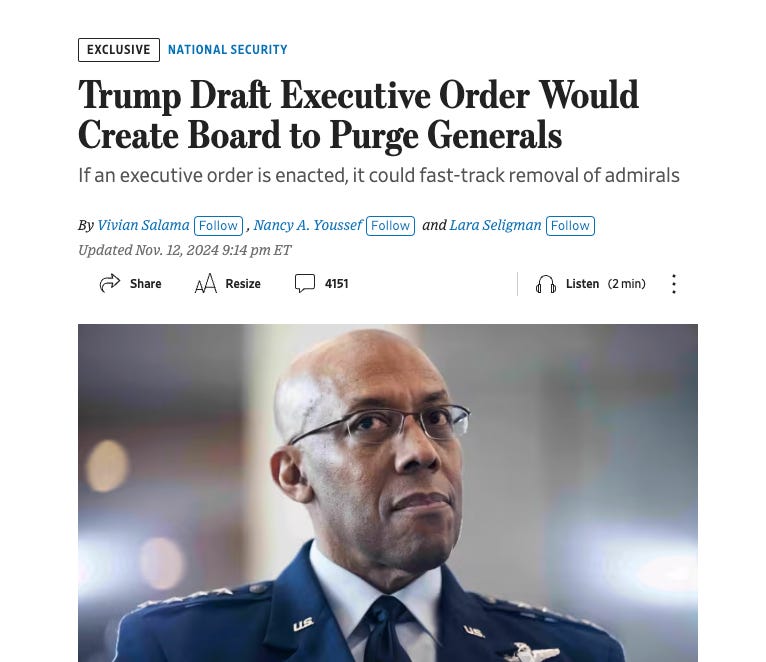
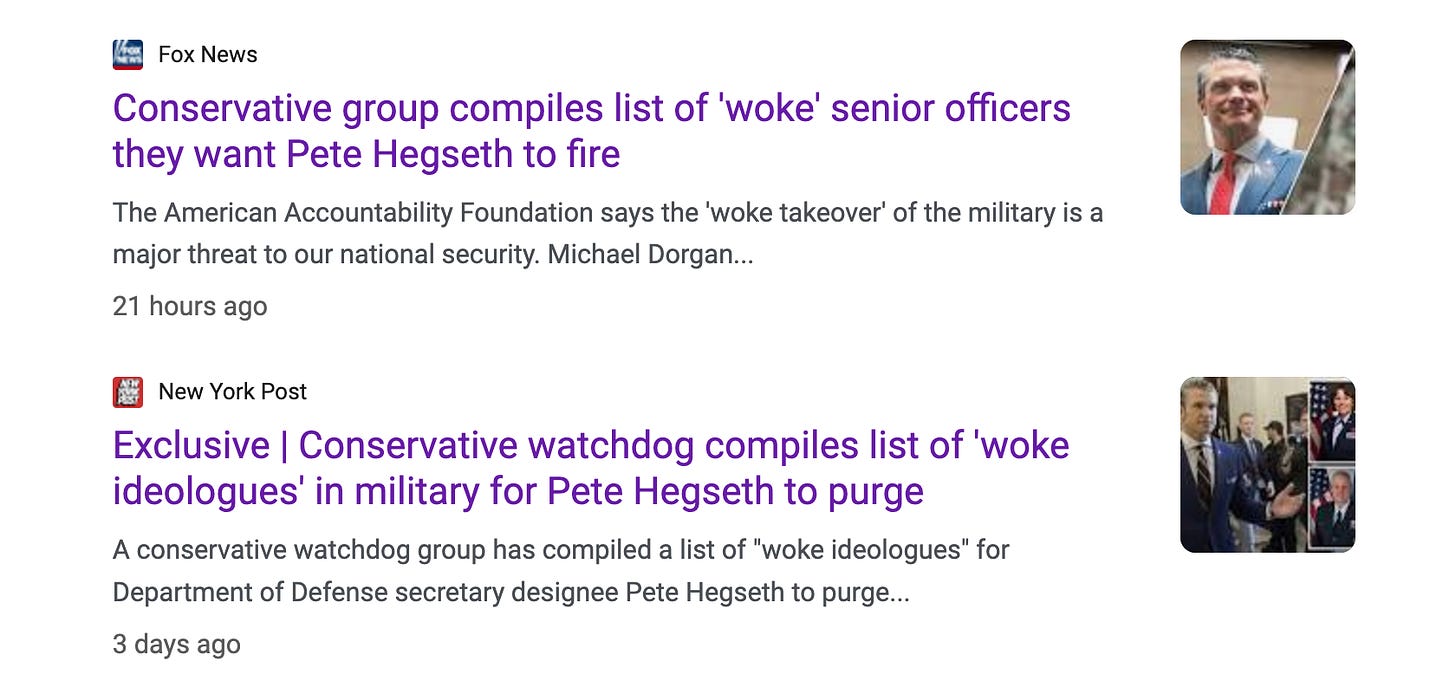
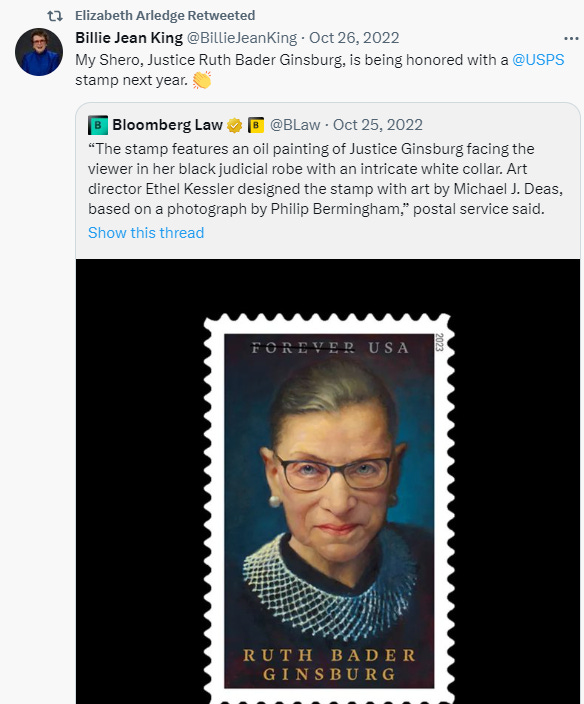

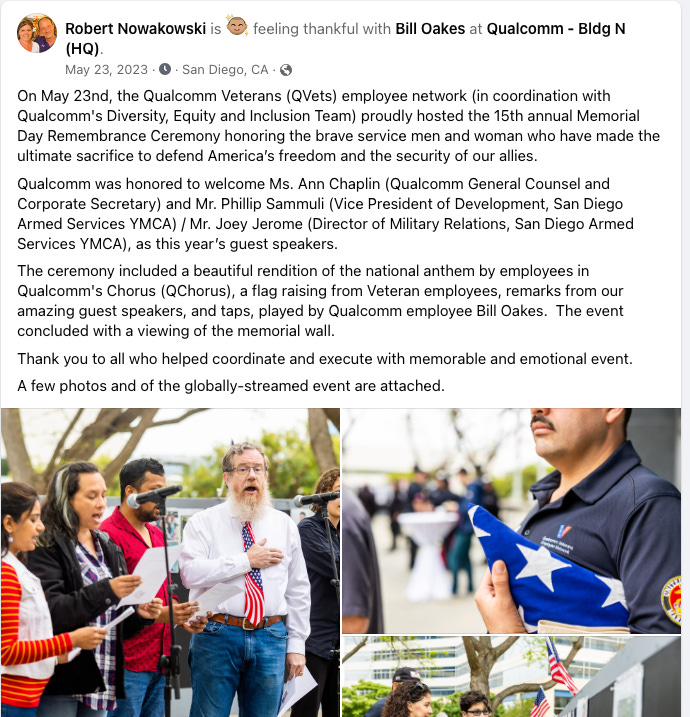
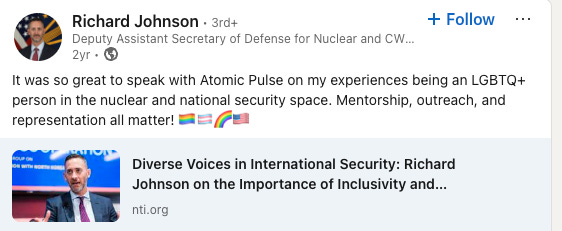

Subverting the military's independence from political leadership is a well-documented and researched part of the decline of democratic governments and the rise of authoritarian rule to replace it. It was often asserted that the United States had moved passed this risk because of the ongoing efforts to develop and maintain a strong, independent, and politically agnostic officer corps. It may turn out our "exceptional" circumstances were not so exceptional after all.
This information about Hegseth, a known sexually abusive predator, would seem to fundamentally contradict the promise he has just made to Republican Senator Joni Ernst. As the only serving female survivor of sexual assault inflicted during her time in the military and an advocate of all survivors of sexual violence by fellow military, she has now openly backed Hegseth. This is because he has said to her that when in power he will pursue long overdue procedural justice for victims of sexual assaults in the military. In this context and given what you have just exposed as his true motives, such words will soon be proven to be very cheap.